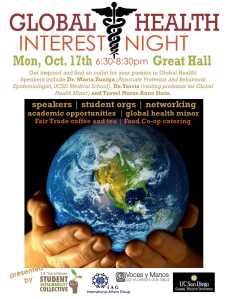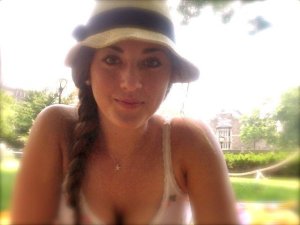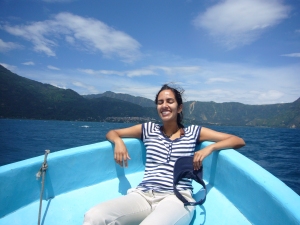Today was a rude awakening for my young naïve aspiring-to-be-a-doctor self. I’ve been beautifully blessed to have good examples of compassionate doctoring in medical school and more specifically through my involvement in the free clinic. I guess it was about time that I ran into some of the realities of how health care functions in the world.
The way that it works for the indigenous people who live here in the aldeas of Rabinal is that there are two NGOs which split and canvas the entire region. Each aldea receives one visit a month from a doctor and their 4 person vaccinating/health educating team. If there are any health problems between these monthly visits, the patients have to wait out their sicknesses or travel to the Centro de Salud (a 3-4 hour walk to reach Rabinal before the Centro opens at 8 in the morning, only to get a spot to wait for a doctor’s visit).
We, the NGO health workers workers and I, arrived in Las Ventanas after an approximately hour long drive on the not-approximately, but most definitely, gnarliest road that I have ever ridden on. Outside the cinderblock clinic at the top of a ridge sat 50ish Mayan women in their brightly colored skirts and huipils, their babies slung on their backs and their other children toddling around. And boy, was I excited to return to clinic.
But I didn’t expect that the first thing the doctor and I would encounter when we entered the door was the community midwife lamenting the loss of an infant in childbirth on Sunday morning. I didn’t expect the doctor to sit down and talk to the family about the baby’s death without every offering a word of solace. I didn’t expect her to immediately scold them for not making it to all of their prenatal checkups. The father said that the reason they didn’t call the community’s emergency committee for a ride to Centro de Salud when things started going wrong with the delivery was that they couldn’t afford to pay the pista for the ride. And I didn’t expect the doctor to once again scold him for thinking that anyone would be so cold-hearted to not loan him the money to take him to medical care to save his baby. Least of all, I didn’t expect for her to only ask for the names of any of the family members so that she could write them on the official report finding them at fault for their baby’s death. Hour One.
Then the physician’s official consults began and I was able to do many things for the first time. I performed an abdominal exam on a pregnant woman and felt the positioning of her baby, I made my first child cry in a doctor’s office, and I heard my first cases of pneumonic lungs. I also saw my first (through eighth) cases of child malnutrition. And it was most interesting what the doctor did in these interactions.
“Escucha” [Listen] she’d say overtly to me.
“¿Cuantos años tiene usted?” [How old are you?] she would direct to the patient.
“Viente” [20].
“¿Y cuantos hijos tiene?” [And how many children do you have?]
“Tres.”
And each time I would get the imploring and incredulous gaze, the gaze which made the mother look down in shame, the gaze which preceded another round of scolding about how each mother should be feeding her baby better. Often this conversation would be followed by one in which the doctor attempted to cajole the mother into birth control because “No puede llevar otro bebé a este mundo que no puede dar alimentacion” [You can’t bring another baby into this world that you can’t feed]. At this point, the patient’s conservative beliefs, cultural background, and the machismo restrictions of her husband would lead her to refuse and lead both women to end the consultation, shaking their heads in disbelief.
As the day wore on I grew more and more disenchanted and incised with the doctor and her attitude toward the patients she was supposed to be serving with compassion and care. Why and how can/does someone treat people like this? Could compassion fatigue cause you to demean your patients? Could the frustration of having the smallest supply of approximately 10 different drugs in your medicine cabinet make your efforts feel pointless? Are the days just too long when your 44th patient of the day at 3pm is another malnourished infant? Is there every a point where personally blaming someone for their consequences of their poverty is an acceptable practice? I left my day of doctor-shadowing in Guatemala with far more questions than I had entered it with.
I hope that this experience remains a reminder of how high a level of patient care we’re able to offer in the US, even in our little free clinic at UCSD. May it be a distinctive forewarning against discriminatory medical practice because of a patient’s cultural background. I pray that the path that I enter as a doctor will never lead me here. And I wonder as I sit on my thin wire bed in my dirt-floored room, if maybe this is the space I’ve been looking for, the medical niche where I fit, living in rural Guatemala.
~Liz Berryman, first year medical student at UCSD School of Medicine
 The event is part of Voces y Manos’ commitment to create learning opportunities with a people-centered approach to Global Health for students in higher education. We first developed the idea as a way to help create greater collaboration between student groups, and to show students the growing academic and service opportunities available at UCSD.
The event is part of Voces y Manos’ commitment to create learning opportunities with a people-centered approach to Global Health for students in higher education. We first developed the idea as a way to help create greater collaboration between student groups, and to show students the growing academic and service opportunities available at UCSD.




